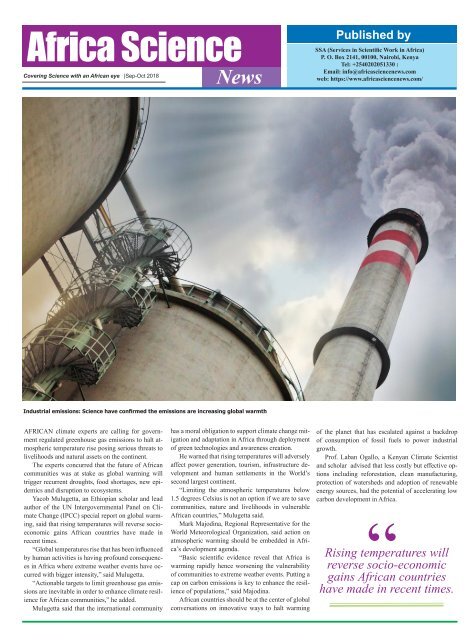The African Science
Covering African science with an African eye
Covering African science with an African eye
You also want an ePaper? Increase the reach of your titles
YUMPU automatically turns print PDFs into web optimized ePapers that Google loves.
Africa <strong>Science</strong><br />
Covering <strong>Science</strong> with an <strong>African</strong> eye |Sep-Oct 2018<br />
News<br />
Published by<br />
SSA (Services in Scientific Work in Africa)<br />
P. O. Box 2141, 00100, Nairobi, Kenya<br />
Tel: +2540202051330 :<br />
Email: info@africasciencenews.com<br />
web: https://www.africasciencenews.com/<br />
Industrial emissions: <strong>Science</strong> have confirmed the emissions are increasing global warmth<br />
<strong>African</strong> climate experts are calling for government<br />
regulated greenhouse gas emissions to halt atmospheric<br />
temperature rise posing serious threats to<br />
livelihoods and natural assets on the continent.<br />
<strong>The</strong> experts concurred that the future of <strong>African</strong><br />
communities was at stake as global warming will<br />
trigger recurrent droughts, food shortages, new epidemics<br />
and disruption to ecosystems.<br />
Yacob Mulugetta, an Ethiopian scholar and lead<br />
author of the UN Intergovernmental Panel on Climate<br />
Change (IPCC) special report on global warming,<br />
said that rising temperatures will reverse socioeconomic<br />
gains <strong>African</strong> countries have made in<br />
recent times.<br />
“Global temperatures rise that has been influenced<br />
by human activities is having profound consequences<br />
in Africa where extreme weather events have occurred<br />
with bigger intensity,” said Mulugetta.<br />
“Actionable targets to limit greenhouse gas emissions<br />
are inevitable in order to enhance climate resilience<br />
for <strong>African</strong> communities,” he added.<br />
Mulugetta said that the international community<br />
has a moral obligation to support climate change mitigation<br />
and adaptation in Africa through deployment<br />
of green technologies and awareness creation.<br />
He warned that rising temperatures will adversely<br />
affect power generation, tourism, infrastructure development<br />
and human settlements in the World’s<br />
second largest continent.<br />
“Limiting the atmospheric temperatures below<br />
1.5 degrees Celsius is not an option if we are to save<br />
communities, nature and livelihoods in vulnerable<br />
<strong>African</strong> countries,” Mulugetta said.<br />
Mark Majodina, Regional Representative for the<br />
World Meteorological Organization, said action on<br />
atmospheric warming should be embedded in Africa’s<br />
development agenda.<br />
“Basic scientific evidence reveal that Africa is<br />
warming rapidly hence worsening the vulnerability<br />
of communities to extreme weather events. Putting a<br />
cap on carbon emissions is key to enhance the resilience<br />
of populations,” said Majodina.<br />
<strong>African</strong> countries should be at the center of global<br />
conversations on innovative ways to halt warming<br />
of the planet that has escalated against a backdrop<br />
of consumption of fossil fuels to power industrial<br />
growth.<br />
Prof. Laban Ogallo, a Kenyan Climate Scientist<br />
and scholar advised that less costly but effective options<br />
including reforestation, clean manufacturing,<br />
protection of watersheds and adoption of renewable<br />
energy sources, had the potential of accelerating low<br />
carbon development in Africa.<br />
Rising temperatures will<br />
reverse socio-economic<br />
gains <strong>African</strong> countries<br />
have made in recent times.



